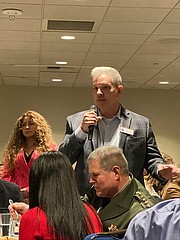What's on the menu? Roast commissioner
Attendees of the Kootenai County Republican Women Federated monthly meeting made one thing very clear Thursday afternoon: They oppose the alternative forms of government study.
In a Coeur d'Alene Resort room packed to the brim with KCRWF members, county officials, and state legislators, all eyes were on Commissioner Bill Brooks. Brooks, the leading advocate for the investigative study, spoke on why he favored revisiting the topic that had already gone before the voters — and failed — twice in the last three decades.
The commission-manager form has received the most public attention of the alternative options, and it has not been complimentary. At the KCRWF's meeting, President Carla Mattare opened the discussion by pulling up a photo of the commission-manager administrative flowchart pulled from the 1997 study available on Brooks' website. Immediately, the crowd murmured.
"Let me just ask you this one question. What, what is so wrong to you about the form of government that we have right now?" Mattare said.
Brooks maintained that no change has been set in stone and that the study commission is still in its early stages.
"That is one page of an 18-page report from the '90s, and I'm not going to be held accountable to what somebody put up there or what they did back then," Brooks said.
He believes it's necessary to rehash the study to allow county residents to consider their options. Comparing it to the United States' separation from Great Britain in 1776, Brooks said it's crucial to investigate alternative government systems.
Reading from the 1997 study findings, Brooks pointed to key reasons he felt Kootenai County citizens should consider having an open mind to change. Both the 1997 and 2012 investigations recommended the adoption of the commission-manager government structure.
"Right now, a single uncooperative elected official can cause havoc within the county. There is no institutional requirement for an elected official to cooperate with the commissioners or other elected officials," Brooks read.
Other weaknesses in the present three-commissioner style referenced by the study include an accountability gap of elected officials, the costly popularity-based electoral process, and how term limits protect "lame-duck" officials.
About 15 minutes into the presentation, KCRWF Vice President Beverly Guenette asked Brooks to address questions about the commission-manager government that the group worried is unfairly favored. Several women referenced the implications of having appointed vs. elected leadership — explicitly pointing to the Panhandle Health District Board of Health.
"Look what happens with appointed people like the Panhandle Health District," one said. "When you appoint people, that's more like a centralized government putting the power in their hands … If the wrong person gets into office, what will be our recourse?"
Another woman at the meeting said that in past communications with Brooks he alluded to the idea that the commissioner himself would assume the commission-manager role if the county enforced the structure.
"That is not what I said," Brooks snapped back. "Either you really misunderstood what I said, or you're making this up. There's a lot of misinformation being intentionally promulgated, or it's out of ignorance."
Brooks argued that while that structure is permitted, it's one of six possible outcomes and not the guaranteed winner.
Echoing the same concerns he has expressed since initially proposing the study last year, Brooks said the current three-commissioner administration inhibits communication.
Bruce Mattare, husband of the KCRWF president and former campaign manager for newly elected Sheriff Bob Norris, pointed out that two commissioners can't meet privately to maintain transparency and accountability with their constituents.
"That's why they have the open meeting law. That says, look if you want to talk about it and do it so that people can see it. That way, you avoid the backroom deals," Bruce Mattare said. "You look at the government nowadays, there are so many backroom secret deals that go on, and then the public can't do anything about it."
The study has not yet begun, but many attendees Thursday made it apparent that it does not have their support.
"People are airing their grievances about this thing, and you're saying 'I don't care what you have to say, I'm going to continue going forward,'" Bruce Mattare said. "So in many respects, you're illustrating what people are afraid of."
SIDEBAR:
To minimize commissioner control of the alternative forms of government study members, commissioners moved to create an ad hoc selection committee that will manage the process.
Consisting of three individuals, the ad hoc committee will interview and nominate the nine members of the alternative forms of government investigative commission and approve them based on a majority vote. Once the nine are chosen, the ad hoc committee will be disbanded.
During the board of commissioners Monday meeting, the three elected officials announced their ad hoc members:
- Commissioner Bill Brooks chose Coeur d’Alene City Councilman Dan Gookin
- Commissioner Chris Fillios picked Kootenai County senior business analyst Nanci Plouffe
- Commissioner Leslie Duncan chose former Kootenai County Commissioner Marc Eberlein



